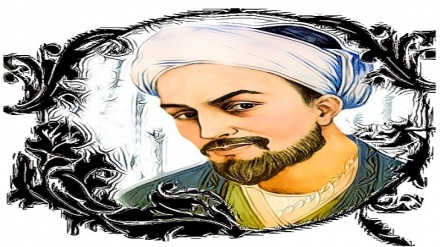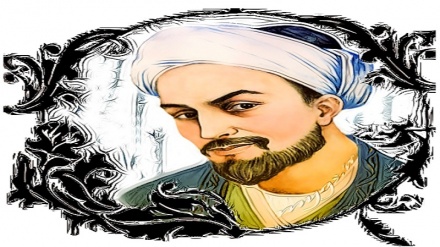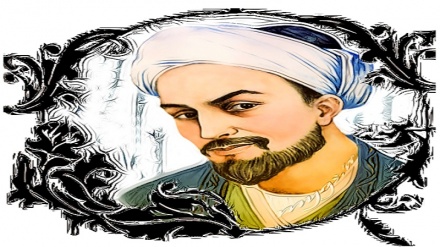Iranian notables, sources of global honor (201)
If you remember, it was said that Fakhruddin Eraqi was a prominent Muslim mystic and poet of Farsi language in the 7th century AH (13th century AD) who was born in Komjan village of Hamedan province. It was also said that he learnt the Qur’an by heart in 9 months at the age of 5.
At the age of 17, Eraqi was a master of all sciences of the day and started teaching in the city of Hamedan. Very soon he left Hamedan for Multan in the Subcontinent to join the pupils of the renowned mystic of the time, Sheikh Baha’uddin Zakaria. Then, he reached a degree in mysticism that Sheikh Zakaria gave his own cloak to Eraqi and he became one of the prominent students of the Sheikh. Later on, he traveled to Mecca, and left there for Konia in today’s Turkey to attend the class of Sheikh Sadruddin Qunavi. Thus, he stayed in Konia till 675 AH when he went to Egypt and then Syria to stay in Damascus till the end of his life. It is said that Eraqi succumbed to a painful and fatal disease when he was 78 or 82 years old. He was buried at Jabal al-Salihiya behind the tomb of Muhyiddin ibn Arabi. Fakhruddin Eraqi has authored several books. This time we are going to review some other features of Fakhruddin Eraqi’s poetry. Stay tuned.
After the concept of love and suffering or pain in the way of love, sorrow and pleasure of sorrow is another feature of Fakhruddin Eraqi’s poetry. The language of mysticism is characterized by the spiritual experiences of the mystic. Thus, the reader or listener can rarely understand the real meaning of the words and expressions since he has not realized those experiences. In view of this, the mystic mentions them through metaphor, allegory and parable. Sorrow is one of those concepts. This pain begins with the feeling of request on the side of the lover to reach the Beloved. It is noteworthy that this sorrow is very hot and painful. A deep study of Eraqi’s poetry reveals that there are two kinds of sorrow. The first kind has a negative connotation and brings about unpleasant end. But, the second kind has a positive connotation and has been described as a lofty and esteemed notion. Sorrow in Eraqi’s view is a visible, palpable, testable and somehow hearable thing. It is so intensive that he has sometimes called it as fire. He considers the state of the lover as a burning and hot fire whose flames cause destruction and injury. He says,
دانم که سوختی ز غم عشق خود مرا لیکن ندانم آنکه چه سانم بسوختی
I know that, in your love’s sorrow, you burnt me
Yet, I do not know in what way you burnt me.
In some of his lyrics, Fakhruddin Eraqi has likened sorrow to a weapon that injures the soul and heart of the lover and imprisons his body. In some other poems he has considered it as a lock put on the tongue and the heart to prevent speech and what the heart receives. Eraqi describes his painful chest as an old mirror which has rusted and is devoid of joy; hence the Beloved should polish it. He has used every tool to make the mystic experiences palpable. He applies food and drink to bring the abstract concepts close to the mind. Sorrow is like a food or drink that can be eaten and drunk to be digested in a bid to train the spirit of the lover. For instance, he says,
گویى که مخورغم، چه کنم گر نخورم؟ چون نیست مرا از تو به جز غم روزى
You tell me not to grieve, so, what shall I do?
As there remains no other sustenance from you.
Elsewhere in his poems, he personifies sorrow as a living creature. In view of this, the feeling of sorrow is not a mere abstract concept for the audience. On one hand, it is a living creature with faculties of discernment, and feeling and the power to oppress, be cruel and shed blood. On the other hand, it can share the sorrow of the sad person.
Eraqi describes sorrow as a powerful and domineering creature which gets the possession of the heart and soul of the lover, assails him and deprives him of his power and authority. In short, it captures and rules over the heart. He says,
جرعه اى ده، مرا ز غم برهان که دلم بی شراب خرّم نیست
Give me a sip and, of sorrow, relieve me,
As my heart rejoices not without wine.
Dear listeners, it should be noted that wine in the poems of the Muslim poets does not mean the intoxicating drink, but it is the state in which the mystic and the lover of God experiences lofty concepts and becomes unaware of his being.
In view of Fakhruddin Eraqi, sorrow accompanies the lover so that he can share his secrets with it.
One of the peculiar concepts in the Farsi poetry, including that of Eraqi, is the concept of happy sorrow. It has its roots in mysticism. Since the second half of the 5th century AH, this concept has resulted in countless concepts. Dr. Saeed Hamidian says, “This new and little understood concept has prevailed through mysticism and Sufism. It means that lofty sorrow has intermingled with happiness and there is no genuine joy that is devoid of any sorrow more or less; and the other way round, there is no lofty sorrow in which there is no joy.”
Eraqi says,
مرا گرچه ز غم جان می برآید غم عشقت زجانم خوشتر آید
Though my life will end by your sorrow
Superior to my life is your love’s sorrow
مرا شادی گهی باشد در این غم که اندوه توام از در در آید
My joy in this sorrow is the moment
That in my heart steps your sorrow
مرا یک ذره اندوه تو خوشتر که یک عالم پر از سیم و زر آید
A tiny bit of your sorrow in my eye,
Excels a world of jewels as it is hollow
Eraqi believes that sorrow is the gift of the Beloved to the lover.
Well dear friends, next time we will get familiar with another notable figure of the Iranian literature. God bless you.
RM/ME


